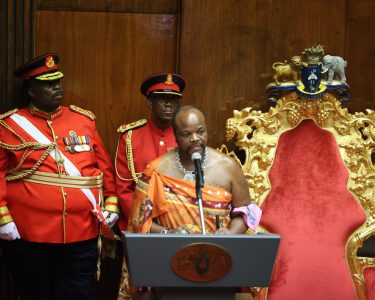
By Khulile Thwala
The African Economic Research Consortium (AERC) has initiated collaborative talks with Eswatini to conduct programmes and research aimed at strengthening the country’s economic policies.
The organisation extended an invitation to EswatiniBank Managing Director Nozizwe Mulela for talks which took place in Nairobi, Kenya on how AERC could establish an active programme in Eswatini.
The EswatiniBank MD was instrumental in forging a way forward as she undertook to initiate introductory talks for the AERC and the Governor of the Central Bank of Eswatini Dr Phil Mnisi, soon after an official communication from AERC. Worth noting is that the AERC also facilitates the Africa Governors’ Forum.
Mulela further indicated her interest in participating in the programmes facilitated by AERC in the kingdom and promised to be the person on the ground for the consortium to create the much-needed referrals and inroads.
The invitation extended to the MD was from AERC’s Executive Director of Training Professor Theophile Azomahau, who also informed Mulela about the Governors Forum and the need for the CBE governor to join this forum.
In 2014, AERC established the African Central Banks Governors’ Forum to ensure African stakeholdership for the long-term sustainability of the organisation’s mission and work on the continent.
Currently, 12 central banks are represented within the Forum. The Governors Forum meets annually and is governed by The Livingstone Resolution. The list of central banks currently affiliated with AERC includes the Bank of Ghana, Central Bank of Kenya, Reserve Bank of Malawi, Banco de Mocambique, Central Bank of Nigeria, National Bank of Rwanda, South African Reserve Bank, Bank of Tanzania, Reserve Bank of Zimbabwe, Bank of Uganda, Bank of Zambia, National Bank of Rwanda and Banque de la Republique du Burundi.
AERC’s mission is to strengthen local capacity for conducting an independent, rigorous inquiry into the problems facing the management of economies in sub-Saharan Africa.
The consortium recently published a 65-page analysis of the current economic situation in Zimbabwe, in a research paper titled Understanding the Fiscal Deficit and Economic Performance in Zimbabwe. The institute further focuses on the analysis of policy issues across economic-based fields.
According to its website, the consortium was established when a small group of Africanists and African scholars began to recognise the disconnect between economic policymaking and economic research in sub-Saharan Africa. Available research results, applied to other economies, did not always seem appropriate to the African context. And where such results were available, they were too often not put to use.
Over the last 30 years, AERC has been at the forefront of building capacity in economic policy research and training on the continent, informing policy debates, and responding to emerging policy priorities. The organisation, through its website, further states that AERC graduate training programmes have created a cadre of economists contributing to policy analysis in Africa and are capable of training future economists.




